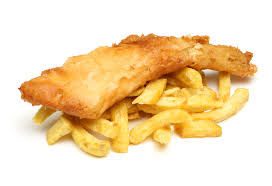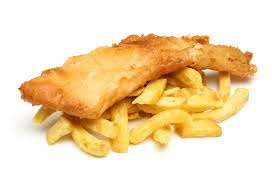
The economy of the United Kingdom is straying farther off course as prices rise. According to insolvency firm Company Debt, a third of fish and chip businesses are at risk of going out of business this year due to a "perfect storm" of price pressures.
In just a year, prices for Britain's favourite fish, cod and haddock, have risen by 75 per cent, sunflower oil by 60 per cent, and flour by 40 per cent, according to Company Debt.
In April, inflation reached a 40-year high of 9%, the highest in the G7, and is expected to grow further. Consumers in the United Kingdom are more gloomy than their European counterparts, prompting criticism of the government and the Bank of England's efforts to keep inflation under control.
Since the combo was established 160 years ago, Britons have been fueling themselves on battered fish and fried chips, the chunky equivalent of fries in the United States.
The dinner is so common in Britain that, unlike other foods, it was not rationed during the wars. Chippies, with their distinct oil and vinegar aroma, are still a common sight in most communities.
According to UK Fisheries, a distant-waters trawler company, some of the recent challenges for fish and chip restaurants came after Brexit, with the amount of Arctic cod Britain is allowed to capture in 2022 reduced to about 40% of what it was before leaving the European Union.
Fuel and energy prices have risen as a result of Russia's invasion of Ukraine, raising the cost of catching and frying fish even more. Cooking oil, fertiliser, and bread prices have all increased as a result of the war.
The war has increased uncertainty about cod and haddock supplies in the Barents Sea, which sits north of Norway and Russia.
In March, the British government announced that Russian white fish would be subject to a 35 per cent levy as part of sanctions imposed in reaction to Ukraine's invasion. For the time being, the change has been put on hold while the impact is investigated.
Sunflower oil is the main agricultural product that the UK buys from Ukraine, and the government says it is attempting to replace it with other vegetable oils, such as increased rapeseed supplies from Australia following a bumper harvest.
"We are working closely with industry, especially the National Federation of Fish Friers, to offset the issues that they are encountering," a spokesman for the Department of Environment, Food and Rural Affairs stated.
The federation, on the other hand, claimed that fish and chip restaurants were experiencing their worst crisis ever.
"I'm getting daily phone calls from people that are worried that they're going to go out of business," NFFF President Andrew Crook told Reuters.
Springboard research suggests that shopper counts in British high streets are down 15% from pre-pandemic levels in 2019.
According to Yael Selfin, Chief Economist at KPMG UK, fish and chip restaurants are more vulnerable than larger firms because they lack the purchasing ability to negotiate better terms when global prices rise.
"We are expecting consumers and households to reassess what they're spending on and potentially cut down," Selfin said.
(Source:www.cnn.com)
In just a year, prices for Britain's favourite fish, cod and haddock, have risen by 75 per cent, sunflower oil by 60 per cent, and flour by 40 per cent, according to Company Debt.
In April, inflation reached a 40-year high of 9%, the highest in the G7, and is expected to grow further. Consumers in the United Kingdom are more gloomy than their European counterparts, prompting criticism of the government and the Bank of England's efforts to keep inflation under control.
Since the combo was established 160 years ago, Britons have been fueling themselves on battered fish and fried chips, the chunky equivalent of fries in the United States.
The dinner is so common in Britain that, unlike other foods, it was not rationed during the wars. Chippies, with their distinct oil and vinegar aroma, are still a common sight in most communities.
According to UK Fisheries, a distant-waters trawler company, some of the recent challenges for fish and chip restaurants came after Brexit, with the amount of Arctic cod Britain is allowed to capture in 2022 reduced to about 40% of what it was before leaving the European Union.
Fuel and energy prices have risen as a result of Russia's invasion of Ukraine, raising the cost of catching and frying fish even more. Cooking oil, fertiliser, and bread prices have all increased as a result of the war.
The war has increased uncertainty about cod and haddock supplies in the Barents Sea, which sits north of Norway and Russia.
In March, the British government announced that Russian white fish would be subject to a 35 per cent levy as part of sanctions imposed in reaction to Ukraine's invasion. For the time being, the change has been put on hold while the impact is investigated.
Sunflower oil is the main agricultural product that the UK buys from Ukraine, and the government says it is attempting to replace it with other vegetable oils, such as increased rapeseed supplies from Australia following a bumper harvest.
"We are working closely with industry, especially the National Federation of Fish Friers, to offset the issues that they are encountering," a spokesman for the Department of Environment, Food and Rural Affairs stated.
The federation, on the other hand, claimed that fish and chip restaurants were experiencing their worst crisis ever.
"I'm getting daily phone calls from people that are worried that they're going to go out of business," NFFF President Andrew Crook told Reuters.
Springboard research suggests that shopper counts in British high streets are down 15% from pre-pandemic levels in 2019.
According to Yael Selfin, Chief Economist at KPMG UK, fish and chip restaurants are more vulnerable than larger firms because they lack the purchasing ability to negotiate better terms when global prices rise.
"We are expecting consumers and households to reassess what they're spending on and potentially cut down," Selfin said.
(Source:www.cnn.com)





